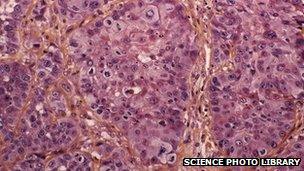Oesophageal cancer trial starts in Wales
- Published

Oesophageal cancer is widely considered to be one of the most difficult to treat
A ground-breaking new approach to treating cancer of the gullet is being trialled by scientists in Wales.
They are trialling a combination of radiotherapy and two different chemotherapy drugs before surgery to try to improve survival rates.
Oesophageal cancer is widely considered to be one of the most difficult to treat.
Figures show there are 8,000 new diagnoses every year, equating to over 150 people a week.
The trial will be taking place in Wales' three cancer centres in Swansea, Cardiff and Rhyl.
"This is a really exciting study that aims to use the most effective drugs combined with cutting edge technologies to find new avenues to treatment," said Dr Tom Crosby, clinical director of Velindre Cancer Centre in Cardiff, who is leading the study.
"Patients' chances of beating this type of cancer are often hampered by late diagnosis, which means doctors are left treating the condition in its advanced stages.
"A new approach is needed if we are to stand a fighting chance of stopping its spread and killing it completely."
More effective
For patients who are suitable for surgery, doctors can either treat them with chemotherapy or with a combination of chemotherapy and radiotherapy (chemo-radiotherapy) before their operation.
Recent studies have shown that chemo-radiotherapy, delivered with new radiation technology and different combinations of chemotherapy drugs, may be safer and more effective than chemotherapy alone.
Following the trial, patients will have their tumour surgically removed and will be monitored by a research team for up to 12 months.
Doctors will look at the side effects experienced by patients, how long they remain free from cancer and whether it has spread to other parts of the body.
The trial is run by the Wales Cancer Trials Unit located within Cardiff University's School of Medicine and could be rolled out across the UK if successful.
"This clinical trial has just opened and has recruited its first few patients," said Dr Gareth Griffiths, director of the Wales Cancer Trials Unit.
"It will give us the evidence to determine whether to investigate this new treatment in a larger number of patients which could show a benefit to patients in terms of survival and could ultimately change routine practice in the UK."
- Published15 November 2013
- Published23 October 2013
- Published10 September 2010
- Published28 August 2010
- Published26 August 2013